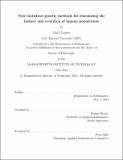| dc.contributor.advisor | Bonnie Berger. | en_US |
| dc.contributor.author | Lipson, Mark (Mark Israel) | en_US |
| dc.contributor.other | Massachusetts Institute of Technology. Department of Mathematics. | en_US |
| dc.date.accessioned | 2014-09-19T19:38:50Z | |
| dc.date.available | 2014-09-19T19:38:50Z | |
| dc.date.copyright | 2014 | en_US |
| dc.date.issued | 2014 | en_US |
| dc.identifier.uri | http://hdl.handle.net/1721.1/89873 | |
| dc.description | Thesis: Ph. D., Massachusetts Institute of Technology, Department of Mathematics, 2014. | en_US |
| dc.description | This electronic version was submitted by the student author. The certified thesis is available in the Institute Archives and Special Collections. | en_US |
| dc.description | Cataloged from student-submitted PDF version of thesis. | en_US |
| dc.description | Includes bibliographical references (pages 165-173). | en_US |
| dc.description.abstract | In the last few decades, the study of human history has been fundamentally changed by our ability to detect the signatures left within our genomes by adaptations, migrations, population size changes, and other processes. Rapid advances in DNA sequencing technology have now made it possible to interrogate these signals at unprecedented levels of detail, but extracting more complex information about the past from patterns of genetic variation requires new and more sophisticated models. This thesis presents a suite of sensitive and efficient statistical tools for learning about human history and evolution from large-scale genetic data. We focus first on the problem of admixture inference and describe two new methods for determining the dates, sources, and proportions of ancestral mixtures between diverged populations. These methods have already been applied to a number of important historical questions, in particular that of tracing the course of the Austronesian expansion in Southeast Asia. We also report a new approach for estimating the human mutation rate, a fundamental parameter in evolutionary genetics, and provide evidence that it is higher than has been proposed in recent pedigree-based studies. | en_US |
| dc.description.statementofresponsibility | by Mark Lipson. | en_US |
| dc.format.extent | 173 pages | en_US |
| dc.language.iso | eng | en_US |
| dc.publisher | Massachusetts Institute of Technology | en_US |
| dc.rights | M.I.T. theses are protected by copyright. They may be viewed from this source for any purpose, but reproduction or distribution in any format is prohibited without written permission. See provided URL for inquiries about permission. | en_US |
| dc.rights.uri | http://dspace.mit.edu/handle/1721.1/7582 | en_US |
| dc.subject | Mathematics. | en_US |
| dc.title | New statistical genetic methods for elucidating the history and evolution of human populations | en_US |
| dc.type | Thesis | en_US |
| dc.description.degree | Ph. D. | en_US |
| dc.contributor.department | Massachusetts Institute of Technology. Department of Mathematics | |
| dc.identifier.oclc | 890211655 | en_US |
